Staff Report #1
June 15, 2021
To All Members of the Accessible Public Transit Advisory Committee
Re: MagnusCard Introduction
Recommendation
That the Committee RECOMMEND the Commission proceed with the implementation of the MagnusCards partnership.
Background
A key underpinning of the Accessibility for Ontarians with Disabilities Act is to make the services provided to the public as accessible to as many Ontarians as possible. Consistent with the requirements of the legislation, London Transit has an Accessibility Plan that sets out planned actions to make the services provided more accessible, and reports on a regular basis the progress against those actions and objectives.
One the of the objectives in the Accessibility Plan is the Integration of the conventional and specialized services, and one of the key steps in that initiative is the update of the “Get on Board” booklet that was created a number of years ago as a way to introduce specialized service customers to the conventional transit service. The booklet was designed in consultation with the Accessible Public Transit Service Advisory Committee, and was intended to be something that riders would carry with them to help them navigate the service. The topics in the booklet included how to read and interpret conventional bus schedules, how to board, how to request a stop, etc. While this booklet was very well received, it didn’t necessarily reach customers with cognitive disabilities in a manner that worked well for them.
Given the significant changes in technology that have taken place since the creation of the original “Get on Board” booklet, it was determined that the replacement should include an option involving an application that could be accessed on a mobile device. An industry scan identified a program that has been adopted by a number of transit systems and has been extremely well received by customers in the areas they serve.
MagnusCards is an application that was originally created to assist those on the autism spectrum to navigate daily activities through a series of queues. They partner with service providers to make digital guides for the various services that each partner offers. The program currently includes guides for a wide range of daily activities including health, food, shopping, safety, attractions and travel. The program has provided the independence required for those on the autism spectrum to access activities on their own that would normally require assistance, including public transit. As the program has rolled out across Canada and the United States, it has also been found to be effective for other groups of transit riders, including seniors, those with other cognitive disabilities including dementia, Down Syndrome, Aspergers, learning disabilities, and people who may be new to the city and unfamiliar with how to access services, as well as those with English as a second language. The introduction of this program will foster a greater inclusion in the customer experience and demonstrate that London Transit continues to be a leader in accessible transit. Finally, this application will also be beneficial to the larger service integration strategy in that it will provide assistance to specialized customers who may require assistance with navigating the conventional service for all or part of a trip in the future.
Organizations that have partnered with MagnusCards in the travel sector include Toronto Pearson Airport, TTC, Brampton Transit, Oakville Transit, MiWay Transit, Guelph Transit and New York City Transit. Users of the MagnusCards application can access all of the digital guides available, which provides a consistent interface for those customers who may be navigating between different transit systems, or travelling to a different city and needing to access the local transit system. For transit partners, a series of digital guides are created to help riders navigate a transit trip, from beginning to end. The images below provide a sample overview of the digital guide for a transit agency in the MagnusCards application.
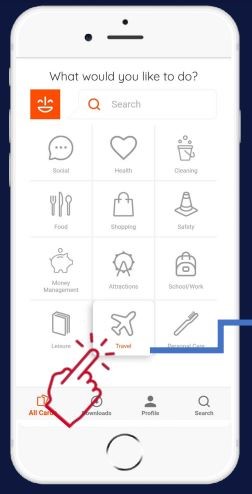 |
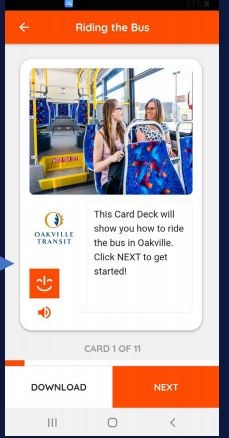 |
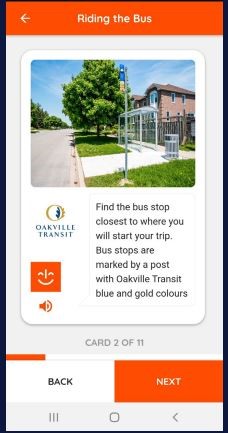 |
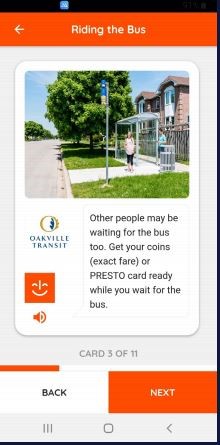 |
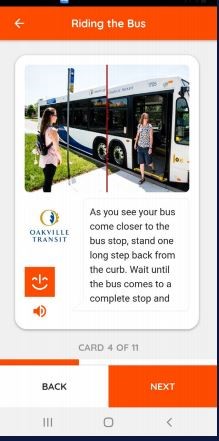 |
As the images illustrate, the digital guide is created to walk a customer through each step involved in taking a transit trip. The actual steps are customizable by agency, and Magnusmode will work with London Transit to create the text instruction included in London’s card deck. They will also take real-world photos of LTC buses and stops to be used on the cards, which provide greater context to users of the application.
The initial cost associated with partnering with MagnusCards is $65,000 which includes the creation of 10 card decks, a promotional video showcasing use of the tool specific to London, and a quarterly metrics report outlining the use of the application. There is also an annual $5,000 hosting and reporting fee. These costs can be accommodated within the 2021 operating budget.
It is recognized that not everyone has access to a mobile device with data capabilities, however the recommendation to proceed with this project does not preclude the development of content in other mediums to be shared with London riders (eg. Website content, downloadable PDF document, etc.). The creation of the content for the MagnusCards implementation will form the basis of the additional options.
Subsequent to Commission approval to proceed with this project, administration will undertake to the partnership arrangement and get the project underway as soon as possible. Further details with respect to the launch of the program, which will include a marketing component, will be provided to the Committee when it is known.
Recommended by:
Kelly S. Paleczny, General Manager